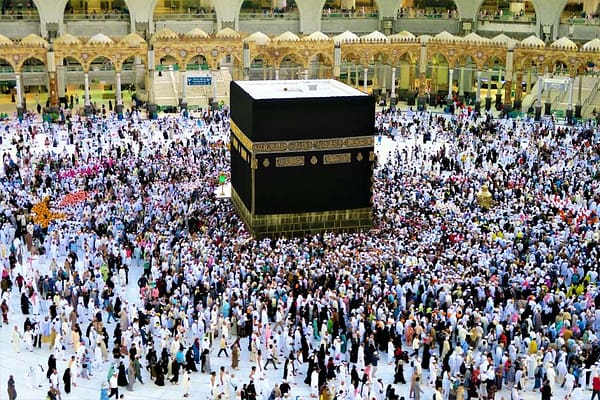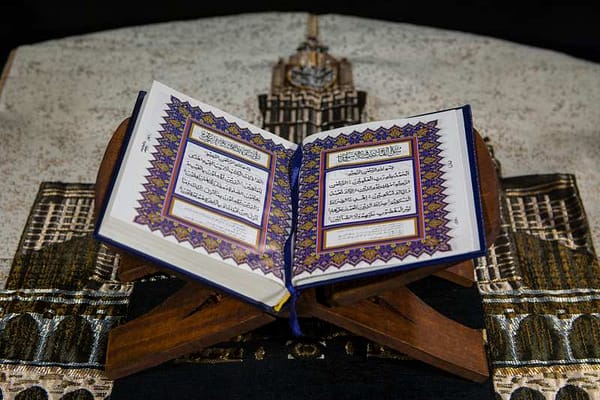Unfolding Religious Islam
The term ‘Religious Islam’ encompasses the rich tapestry of faith and practice observed by over a billion people worldwide. From the Five Pillars of Islam to the diverse cultural practices seen across the Muslim world, ‘Religious Islam’ is a testament to the profound depth and breadth of this faith.
Table of Contents
Understanding ‘Religious Islam’
‘Religious Islam’ refers to the faith and practices observed by Muslims worldwide. It is a monotheistic religion that emphasizes the unity of God, known as ‘Allah’ in Arabic, and acknowledges Muhammad as his final messenger.
The term ‘Islam’ itself means ‘submission’, specifically surrender to the will of Allah. This surrender is not just about belief, but it is a comprehensive way of life that guides its followers in all aspects of life.

The teachings of Islam are based on the Quran, which is considered the literal word of God, and the Hadiths, which are accounts of the sayings and actions of Prophet Muhammad. Muslims believe that Muhammad is the last in a series of prophets, which includes Adam, Noah, Abraham, Moses, and Jesus.
The Five Pillars of Islam – Shahada (faith), Salah (prayer), Zakat (charity), Sawm (fasting during Ramadan), and Hajj (pilgrimage to Mecca) – form the foundation of ‘Religious Islam. These pillars represent a lifetime commitment and are the foundation of a Muslim’s life.
‘Religious Islam’ also encompasses a diverse range of beliefs and practices as it is followed by people from different cultures and communities around the world. Despite this diversity, all Muslims are bound by a common faith and a sense of belonging to a single community.
The Five Pillars of Religious Islam
1. Shahada (Declaration of Faith)
The Shahada is the Muslim profession of faith and the first of the Five Pillars of Islam. It is expressed in the following way: “There is no god but Allah, and Muhammad is the Messenger of Allah.” This declaration affirms the oneness of God and acknowledges Muhammad as his prophet. It is a set statement normally recited in Arabic.
2. Salah (Prayer)
Salah is the obligatory Muslim prayers, performed five times each day by Muslims. It is the second pillar of Islam. The prayer ritual, which is over 1400 years old, is repeated five times a day by hundreds of millions of people all round the world. The prayer includes standing, bowing, prostrating, and sitting.
3. Zakat (Almsgiving)
Zakat is the practice of charitable giving by Muslims based on accumulated wealth, and is obligatory for all who are able to do so. It is considered to be a personal responsibility for Muslims to ease economic hardship for others and eliminate inequality.
4. Sawm (Fasting)
Sawm is fasting. It’s the fourth of the Five Pillars of Islam. Muslims are expected to fast from dawn to dusk during the month of Ramadan, the ninth month of the Islamic calendar. This means not consuming food, drink, and other physical needs in the daylight hours.
5. Hajj (Pilgrimage)
The Hajj is a pilgrimage that occurs during the Islamic month of Dhu al-Hijjah to the holy city of Mecca, and is the fifth pillar of Islam. Every able-bodied Muslim is obliged to make the pilgrimage to Mecca at least once in their lifetime if they can afford it.
Religious Islam Beliefs and Practices
Religious Islam is a major world religion that emphasizes monotheism, the unity of God (‘Allah’ in Arabic), and Muhammad as his final messenger in a series of revelations. The Arabic word ‘islām’ means “surrender”—specifically, surrender to the will of the one God, Allah. Here are some key beliefs and practices in Islam:
- Monotheism: Muslims believe in the oneness of God, known as ‘Allah’ in Arabic.
- Prophethood: Muslims regard the Prophet Muhammad as the last and most perfect of God’s messengers, who include Adam, Abraham, Moses, Jesus, and others.
- The Qur’an: The sacred scripture of Islam is the Qur’an, which contains God’s revelations to Muhammad. Muslims believe it to be the literal word of God.
- Five Pillars of Islam: The religious obligations of all Muslims are summed up in the Five Pillars of Islam, which include the profession of faith (shahādah) in God and his Prophet, prayer (ṣalāt), charity (zakāt), pilgrimage (hajj), and fasting (ṣawm).
- Sharia Law: The fundamental concept of Islam is the sharia —its law, which embraces the total way of life commanded by God.
- Community Worship: Observant Muslims pray five times a day and join in community worship on Fridays at a mosque, where worship is led by an imam.
- Pilgrimage to Mecca: Every believer is required to make a pilgrimage to Mecca, the holiest city, at least once in a lifetime, barring poverty or physical incapacity.
- Fasting: The month of Ramadan is set aside for fasting.
- Prohibitions: Alcohol and pork are always forbidden, as are gambling, usury, fraud, slander, and the making of images.
- Celebrations: In addition to Eid al-Fitr, which celebrates the breaking of the fast of Ramadan, Muslims celebrate Muhammad’s birthday and his ascension into heaven. Eid al-Adha marks the culmination of pilgrimage to Mecca.
Quran and Hadith
The Quran and Hadith are two fundamental sources of Islamic teachings.
Quran

The Quran is considered the holy book of Islam, believed to be the word of God as revealed to Prophet Muhammad. It is considered the ultimate authority and the primary source of Islamic teachings. The Quran lays down the fundamental principles of Islam.
Hadith
On the other hand, Hadith refers to the sayings, actions, and approvals of Prophet Muhammad, as reported by his companions. While the Quran lays down the fundamental principles of Islam, the Hadith complements it by providing practical applications and detailed explanations. It elucidates the context behind Quranic revelations and offers insight into how Muslims should implement these teachings in their daily lives.
For example, the Hadiths of Prophet Muhammad hold a distinctive place as guiding beacons illuminating the path of believers. They provide a practical understanding of the Quran and offer indispensable guidance on matters of faith, ethics, and daily conduct.
Through learning and embodying these teachings, Muslims can navigate the complexities of the modern world while remaining anchored in the principles laid down by the Prophet.
Misconceptions About Religious Islam
Muslims Worship a Moon-God
Some non-Muslims mistakenly believe that Allah is an “Arab god,” a “moon god” or some sort of idol. Allah, in the Arabic language, is the proper name of the One True God. Arabic-speaking Christians use the same word for the Almighty.
Muslims Don’t Believe in Jesus
In the Qur’an, stories about the life and teachings of Jesus Christ (called ‘Isa in Arabic) are abundant. Muslims believe that Jesus was a fully human prophet and not in any way divine himself.
Most Muslims Are Arabs
While Islam is often associated with Arabic people, they make up only 15 percent of the world’s Muslim population. The country with the largest population of Muslims is Indonesia.
Islam Oppresses Women
Most of the ill-treatment that women receive in the Muslim world is based on local culture and traditions, without any basis in the faith of Islam itself. In fact, practices such as forced marriage, spousal abuse, and restricted movement directly contradict Islamic law governing family behavior and personal freedom.
Muslims Are Violent, Terrorist Extremists
Terrorism cannot be justified under any valid interpretation of the Islamic faith. The entire Qur’an, taken as a complete text, gives a message of hope, faith, and peace to a faith community of one billion people.
Religious Islam Is Intolerant of Other Faiths
Throughout the Qur’an, Muslims are reminded that they are not the only ones who worship God. Jews and Christians are called “People of the Book,” meaning that the people who have received previous revelations from the One Almighty God that we all worship.
Modernity and Religious Islam
Modernity refers to the socio-cultural norms, attitudes, and practices that developed in post-medieval Europe and have since spread around the world.
It’s often associated with rationalism, personal freedom, individualism, social, scientific and technological progress, industrialization, secularization, democracy, public education, etc. The interaction between Islam and modernity is complex and multidimensional.
Islamic Modernism
Islamic modernism is a movement that aimed to reconcile Islamic faith with modern values such as democracy, rights, nationalism, rationality, science, equality, and progress. It represents the first Muslim ideological response to the Western cultural challenge.
Challenges in the Modern World
Islam today faces challenges from within and from the wider world. The critical problems are the fundamental tensions within Islam. The attitudes and criticisms common in the outside world can be ignored as misguided or hostile, but the tensions within Islam throughout the world must be confronted.
Changing Centers of Religious Islam
In a simple geographical sense, Islam has to come to grips with its changing centers. The religious centers define the heartland: Saudi Arabia maintains its guardianship of the shrines at Mecca and Medina, and the conduct of the hajj. However, this wealth is based on finite resources, and in the years to come the economic center will shift to those parts of the Muslim world with sustainable resources and reproductive assets.
Social Issues
Despite the ideals promoting an equitable and productive material life, the overwhelming majority of Muslims experience living standards which are hardly enviable by any standard. This frequently appears to be a greater paradox in the wealthy oil-producing Muslim countries.
Intellectual Center of Religious Islam
The intellectual center of Islam is Al-Azhar in Cairo. The ideas and attitudes taught here are spread throughout the ummah, particularly through the population centers of Islam: Indonesia, Pakistan, Bangladesh, India and Malaysia.

Islamic Finance
Islamic finance refers to financial activities that adhere to Shariah (Islamic law). Here are some key principles and aspects of Islamic finance:
- Equity-Based and Asset-Backed Islamic finance is equity-based and asset-backed. This means that financial transactions are typically tied to tangible assets, and both parties share the risks and rewards of the investment.
- Prohibition of Interest One of the fundamental principles of Islamic banking is the prohibition of the collection and payment of interest (known as ‘riba’ in Arabic) by lenders and investors. This is because interest is seen as a form of exploitation.
- Profit and Loss Sharing Another key principle of Islamic finance is the sharing of profit and loss. This promotes risk sharing and connects the financial sector with the real economy.
- Ethical, Sustainable, and Socially-Responsible Islamic finance promotes ethical, sustainable, and socially responsible finance. It emphasizes financial inclusion and social welfare.
- Prohibition of Speculation Islamic finance prohibits excessive speculation or gambling, which is referred to as ‘maisir’. This is to prevent uncertainty or ambiguity in contracts.
- Compliance with Shariah All transactions in Islamic finance must comply with Shariah, the legal code of Islam (based on the teachings of the Quran). This includes principles such as justice, fairness, and the prohibition of harmful practices.
Islamic Productivity
Islamic productivity is a holistic concept that goes beyond mere efficiency or output. Here are some key aspects of Islamic productivity:
- Focus, Purpose, and Goals Islam provides focus, purpose, and goals, which are all crucial ingredients for productivity. It gives a clear direction and purpose to life, which can motivate individuals to be more productive.
- Spiritual Tools Religious Islam provides spiritual tools for productivity. These tools can help individuals maintain a positive state of mind, manage their emotions, and stay motivated.
- Value-Based Productivity Islamic productivity is value-based. It emphasizes the importance of values such as Ihsan (Excellence), Itqan (Perfection), Taqwa (Piety), Shukr (Gratitude), Istiqamah (Steadfastness), Sabr (Patience), Tawakkul (Trust in God), and Barakah (Blessing).
- Beyond Tangible Indicators From the Islamic perspective, productivity is measured beyond tangible indicators. It’s not just about physical output or efficiency, but also about the quality of one’s deeds and their lasting impact.
- Prioritizing the Afterlife The Quran and Sunnah remind believers to prioritize the Afterlife. While wealth and children enhance the quality of life, true productivity lies in producing virtuous deeds that last, like raising righteous children or spending a large portion of one’s wealth in charity.
Diversity in ‘Religious Islam’
‘Diversity in Religious Islam’ refers to the wide range of beliefs, practices, and interpretations found within the Islamic faith. This diversity is a reflection of the global Muslim population, which spans numerous countries, cultures, and traditions.
- Levels of Religious Commitment: The level of religious commitment can vary significantly among Muslims. This can be influenced by factors such as cultural context, personal beliefs, and societal norms.
- Interpretations of Faith: There is openness to multiple interpretations of the Islamic faith. These interpretations can differ based on various factors, including theological understanding, cultural influences, and personal beliefs.
- Acceptance of Various Sects and Movements: Islam encompasses various sects and movements, each with its unique beliefs and practices. These include major sects like Sunni and Shia, as well as various schools of thought within these sects.
- Cultural Diversity: Cultural diversity plays a significant role in shaping ‘Religious Islam’. Muslims around the world have incorporated their unique cultural practices and traditions into their expression of Islam.
- Commonalities in Diverse Religions: Despite the diversity, there are commonalities in diverse religions that can be used as a model for civilizational dialogue towards achieving harmony.
Conclusion
‘Religious Islam’ is a journey of faith that calls for submission to Allah’s will and service to humanity. It is a faith that, despite its vast diversity, brings its followers together under the banner of shared beliefs and rituals.
FAQ
What is a religion in Islam?
Islam is an Abrahamic monotheistic religion that emphasizes the unity of God, known as ‘Allah’ in Arabic, and acknowledges Muhammad as his final messenger. The term ‘Islam’ itself means ‘submission’, specifically surrender to the will of the one God, Allah.
The teachings of Islam are based on the Quran, which is considered the literal word of God, and the Hadiths, which are accounts of the sayings and actions of Prophet Muhammad. Muslims believe that Muhammad is the last in a series of prophets, which includes Adam, Noah, Abraham, Moses, and Jesus.
The Five Pillars of Islam – Shahada (faith), Salah (prayer), Zakat (charity), Sawm (fasting during Ramadan), and Hajj (pilgrimage to Mecca) – form the foundation of ‘Religious Islam. These pillars represent a lifetime commitment and are the foundation of a Muslim’s life.
What are the 4 religions in Islam?
Islam is a monotheistic religion that believes in the oneness of God, known as ‘Allah’ in Arabic, and acknowledges Muhammad as his final messenger. However, there are several major branches or sects within Islam, each with its unique beliefs and practices. While there isn’t a classification of “four religions in Islam”, here are four significant branches:
- Sunni Islam: This is the largest denomination of Islam, representing about 89-90% of all Muslims. Sunni Muslims believe that Muhammad did not appoint a specific successor.
- Shia Islam: Shia Muslims believe that Muhammad chose Ali ibn Abi Talib, his son-in-law, as his successor. This branch is more about the cleric’s interpretation of the Qur’an.
- Ibadi Islam: This is an orthodox version of Islam that predates both Sunni and Shia Islam. Ibadis believe that the Muslim community can rule itself without a single leader.
- Ahmadiyya Islam: This is a newer branch of Islam that does not recognize Muhammad as the last prophet. It has its roots in the teachings of Mirza Ghulam Ahmad.
What are the 6 main beliefs of Islam?
- Belief in the Oneness of God (Tawhid): Muslims believe that there is only one God, who is the creator of all things. God is all-powerful, all-knowing, and has no offspring, race, gender, or body.
- Belief in the Angels of God: Muslims believe in angels, unseen beings who worship God and carry out His orders throughout the universe. The angel Gabriel is notably recognized for bringing the divine revelation to the prophets.
- Belief in the Books of God: This includes the belief that God revealed holy books or scriptures to a number of God’s messengers. These books include the Quran (given to Muhammad), the Torah (given to Moses), the Gospel (given to Jesus), the Psalms (given to David), and the Scrolls (given to Abraham). Muslims believe that the Quran remains in its original form as first revealed.
- Belief in the Prophets or Messengers of God: Muslims believe that God’s guidance has been revealed through specially appointed messengers or prophets throughout history, starting with Adam and including other prophets like Noah, Abraham, Moses, and Jesus. Muhammad is considered the last prophet, sent for all humankind with the message of Islam.
- Belief in the Day of Judgment: Muslims believe that humans will be judged for their actions in this life on the Day of Judgment. Those who followed God’s guidance will be rewarded with paradise, while those who rejected it will be punished with hell.
- Belief in the Divine Decree (Qadar): This belief addresses the concept of divine decree, suggesting that everything is governed by it. It implies that all that happens is preordained, and believers should respond to the good or bad that befalls them with thankfulness or patience. This belief coexists with the concept of free will, as humans do not have prior knowledge of God’s decree.
What are the 7 things haram in Islam?
In Islam, “haram” refers to actions or things that are strictly forbidden by the Quran and the Sunnah. Here are seven significant haram actions based on Islamic teachings:
- Shirk (Associating partners with Allah): This is considered the gravest sin in Islam, which involves associating partners or equals with Allah.
- Witchcraft: Engaging in witchcraft or sorcery, which often involves seeking the help of jinn and goes against the Tawhid (the oneness of Allah).
- Killing a soul unjustly: Taking a life unjustly is strictly forbidden, except in cases permitted by Islamic law.
- Consuming orphans’ wealth unjustly: Misusing or taking the wealth of orphans without rightful cause.
- Consuming Riba (Interest): Engaging in usury or interest, especially when it leads to exploitation.
- Fleeing from the battlefield: Deserting one’s post or running away from the battlefield during a legitimate fight in the path of Allah.
- Slandering chaste, innocent women: Accusing chaste women of adultery or other immoral acts without evidence.
Related Articles
References
- Islam – Wikipedia
- Islam | Religion, Beliefs, Practices, & Facts | Britannica
- An Islamic Perspective in Managing Religious Diversity (um.edu.my)
- Pew I: Diversity in Islam | Wilson Center
- The World’s Muslims: Unity and Diversity | Pew Research Center
- Six Major Beliefs In Islam | The Basics to Islam (udel.edu)
- 7 Major Sins in Islam: What Are They? – Islam Question & Answer (islamqa.info)
- Hadith vs. Quran – What’s the Difference? | This vs. That (thisvsthat.io)
- The Significance of Hadith in Islam: A Guiding Light for Humanity – The Muslim Vibe
- 51 Short Hadiths Every Muslim Should Know with Explanation – The Thinking Muslim
- 10 Myths About Islam (learnreligions.com)
- Islamic Banking and Finance Definition: History and Example (investopedia.com)
- 10.pdf (arcjournals.org)


Pingback: Malaysian Religious - MsiaBuzz